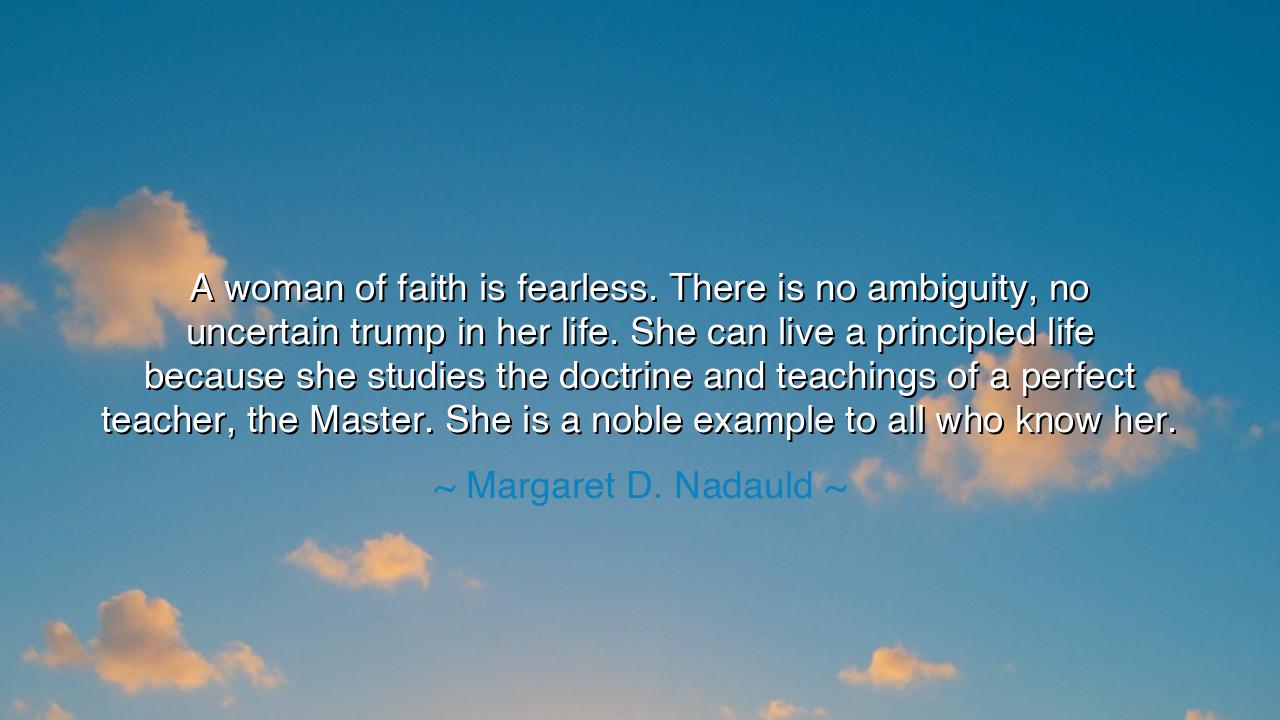
A woman of faith is fearless. There is no ambiguity, no
A woman of faith is fearless. There is no ambiguity, no uncertain trump in her life. She can live a principled life because she studies the doctrine and teachings of a perfect teacher, the Master. She is a noble example to all who know her.






The words of Margaret D. Nadauld—“A woman of faith is fearless. There is no ambiguity, no uncertain trump in her life. She can live a principled life because she studies the doctrine and teachings of a perfect teacher, the Master. She is a noble example to all who know her”—shine like a lamp set upon a hill. They proclaim that true strength is not found in might of arms nor wealth of gold, but in the steadfastness of faith. For the woman who roots her life in the eternal, fear loses its grip, and confusion dissolves into clarity. Her life becomes a firm path, her example a beacon to others.
The origin of this truth is as ancient as humanity itself. Across cultures and ages, the faithful have always been marked by their courage. Where others trembled before kings, armies, or storms, those anchored in higher purpose stood firm. The scriptures of many traditions tell of women whose faith turned the course of history: women who prayed, who obeyed, who trusted in the Master above all earthly powers. Nadauld, drawing upon this legacy, reminds us that such faith is not fragile piety, but iron strength veiled in gentleness.
Consider the story of Joan of Arc, a peasant girl who heard the call of God and rose to lead armies. Though ridiculed, slandered, and ultimately condemned by men in power, she was fearless because her faith was unwavering. There was no ambiguity in her heart; she believed she was guided by the divine. And though she was burned at the stake, her spirit blazed brighter than the fire that consumed her. Centuries later, she remains not only a saint but a symbol of fearless devotion. She was, as Nadauld describes, a “noble example to all who know her.”
The emotional power of Nadauld’s words lies in their reminder that fearlessness does not mean recklessness, but living with clarity of principle. The woman of faith does not wander in uncertainty, for her compass is fixed. The “uncertain trump” of worldly voices cannot confuse her, for she heeds only the call of her perfect teacher, the Master. In an age filled with noise, with shifting morals and countless distractions, such a life of focus and purity stands as a heroic act.
Yet this teaching is not reserved for women alone—it speaks to all who desire strength of spirit. To live without fear, one must build upon an unshakable foundation. If the winds of fortune alone determine one’s course, then terror will come with every storm. But if one builds upon faith—whether in God, in truth, or in a noble purpose—then courage flows naturally, and every choice becomes a reflection of higher law. This is why Nadauld ties fearlessness to doctrine and teachings: principles are the soil from which courage grows.
The lesson for us today is clear: if we desire lives of clarity, courage, and influence, we must anchor ourselves in what is eternal. For some, this means turning to the words of the Master, Christ. For others, it may mean a devotion to truth, justice, or virtue. What matters is that the foundation be strong, unshakable, and worthy of trust. From such grounding comes the power to live without fear, to inspire others, and to be noble examples in our families, communities, and nations.
What, then, shall we do? Let us study deeply, not skimming lightly across the surface of truth. Let us practice the principles we profess, so that our lives match our words. Let us cultivate fearlessness, not by denying fear, but by anchoring ourselves in something greater than fear. And let us honor those women of faith—past and present—who show us that courage need not roar, but can shine through quiet constancy, steady service, and principled living.
Thus Nadauld’s words, though spoken of women, speak to all humanity: that the fearless life is the faithful life. The woman—or man—who walks with the Master, who grounds their days in doctrine, who lives with clarity and principle, becomes a pillar of strength for all who behold them. And in such lives we find proof that faith is not weakness, but the wellspring of enduring courage.






AAdministratorAdministrator
Welcome, honored guests. Please leave a comment, we will respond soon